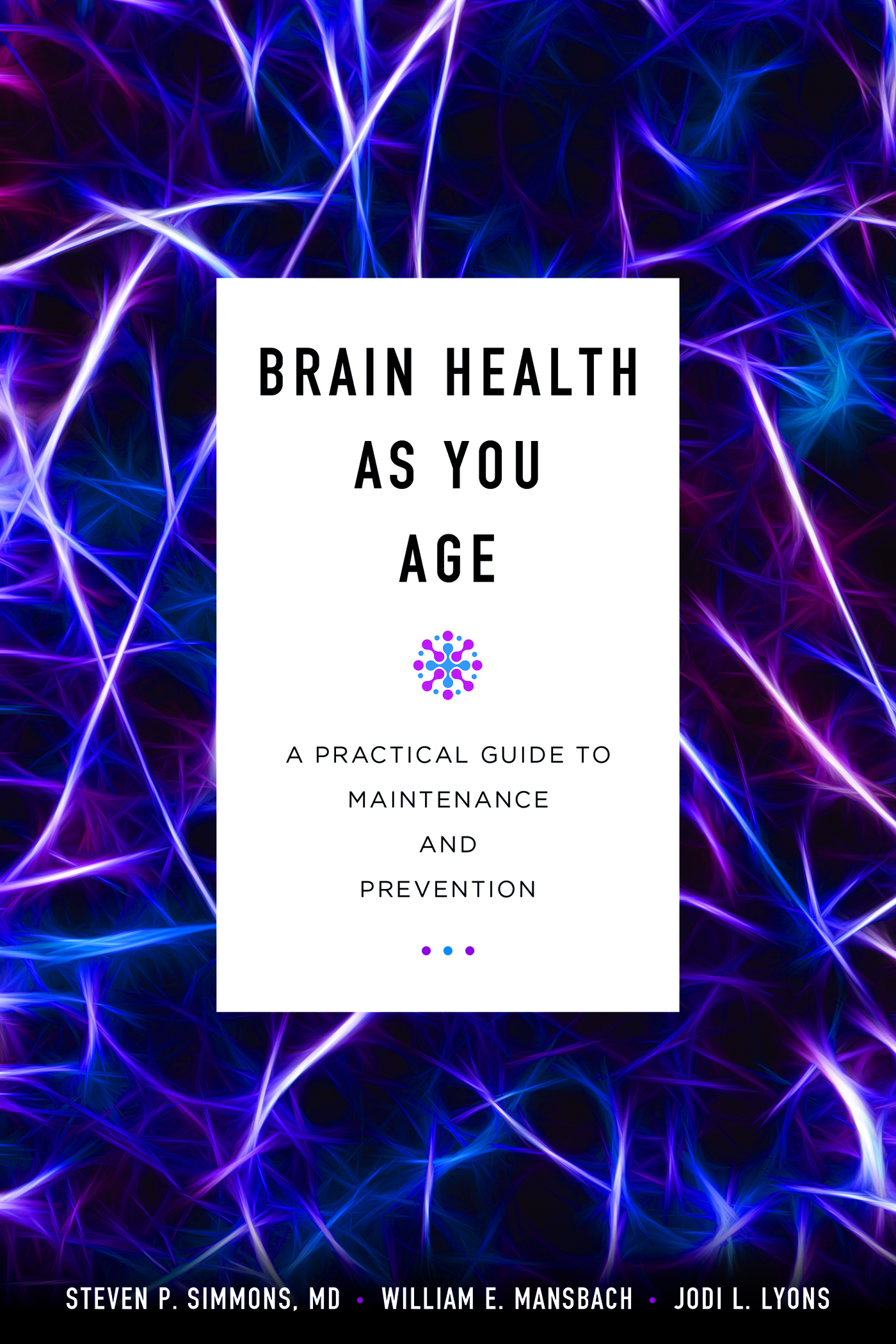Brain Health as You Age
Brain Health as You Age
A Practical Guide to
Maintenance and Prevention
Steven P. Simmons
William E. Mansbach
Jodi L. Lyons
ROWMAN & LITTLEFIELD
Lanham Boulder New York London
Published by Rowman & Littlefield
An imprint of The Rowman & Littlefield Publishing Group, Inc.
4501 Forbes Boulevard, Suite 200, Lanham, Maryland 20706
www.rowman.com
Unit A, Whitacre Mews, 26-34 Stannary Street, London SE11 4AB
Copyright 2018 by The Rowman & Littlefield Publishing Group, Inc.
All rights reserved. No part of this book may be reproduced in any form or by any electronic or mechanical means, including information storage and retrieval systems, without written permission from the publisher, except by a reviewer who may quote passages in a review.
British Library Cataloguing in Publication Information Available
Library of Congress Cataloging-in-Publication Data
Names: Simmons, Steven P., 1966, author. | Mansbach, William E., 1959, author. | Lyons, Jodi L., 1966, author.
Title: Brain health as you age : a practical guide to maintenance and prevention / Steven P. Simmons, William E. Mansbach, Jodi L. Lyons.
Description: Lanham : Rowman & Littlefield, [2018] | Includes bibliographical references and index.
Identifiers: LCCN 2018009451 (print) | LCCN 2018010511 (ebook) | ISBN 9781538109175 (ebook) | ISBN 9781538109168 (cloth : alk. paper)
Subjects: | MESH: Neurocognitive Disordersprevention & control | Brain | Cognitive Aging | Popular Works
Classification: LCC RA790 (ebook) | LCC RA790 (print) | NLM WM 204 | DDC 616.8/045dc23
LC record available at https://lccn.loc.gov/2018009451
 TM The paper used in this publication meets the minimum requirements of American National Standard for Information Sciences Permanence of Paper for Printed Library Materials, ANSI/NISO Z39.48-1992.
TM The paper used in this publication meets the minimum requirements of American National Standard for Information Sciences Permanence of Paper for Printed Library Materials, ANSI/NISO Z39.48-1992.
Printed in the United States of America
Acknowledgments
We are grateful to our editor, Suzanne Staszak-Silva, the team at Rowman & Littlefield, and our agent, Diane Nine, Esq. Without them, this book would not have been possible.
We thank Dr. Melissa Tanner and Patricia Davenport for their contributions, hard work, and good humor.
Finally, we thank our families for their patience and support, particularly throughout the writing and editing processes.
Disclaimer
The names, stories, characters, businesses, and events contained in this book are anecdotes and are used for illustrative purposes only to reflect situations common to all of us as we grow older. Identifying details have been changed, names are fictitious, and any resemblance to actual people, living or dead, is purely coincidental. This book does not provide medical recommendations, medical advice, diagnoses, or treatments, nor is it intended as a substitute for medical advice. Readers should consult their medical providers.
Introduction
Your brain is agingthats a reality. When the topic of brain health is raised among middle-aged and older adults, a flurry of questions tends to follow: What is normal brain aging? When do changes that seem to be age related become cause for concern? Are there early warning signs of cognitive impairment? Am I at risk for cognitive impairment? Am I exhibiting deficits that go beyond normal brain aging? If so, is there anything I can do to reverse them or slow the rate of decline? Is there anything I can do to maintain my brain health as I age?
We wrote this book to help you find the answers to these questions and more as we navigate the complex thicket that is the aging brain. We bring decades of experience in the fields of cognition, neurophysiology, and senior care as a leading neurocognitive expert, a house-call physician who is passionate about bringing high-quality medical care to his patients, and an expert eldercare consultant who helps connect older adults and those with special needs to the care resources they need. This book merges our expertise, practical experience, and peer-reviewed research to educate, dispel common myths, and quell anxiety about age-related brain changes.
We start by explaining the underlying neurophysiology of the brain and how it affects brain health. We explore potential problems in brain health and how to differentiate these from normal brain aging. Then we identify the spectrum of cognitive challenges, including those that are reversible and those that are not, and describe risk factors for cognitive impairment (presenting scientifically validated ways to lower your risk). We also cover next steps for living with cognitive issues while prolonging and maximizing an independent lifestyle. Finally, we answer common caregiving questions, such as how to know when its time to make a change, how to find good care, and how to support both the caregivers and the people receiving care.
Maintaining brain health and dealing with cognitive impairment are serious issues. There are no easy answers. But it is our hope that reading this book will empower you to identify existing or potential problems and use a proactive approach to keep your brain as healthy as possible for as long as possible.
Chapter 1
Why Do We Care about Brain Health?
Have you ever walked into a room and forgotten why you were there? Spent twenty minutes looking for your reading glasses, only to find them on the top of your head? Or have you started making lists so that you can remember things? Have you stared at the bottle of pills and not remembered if you already took them? Are you realizing that someone you are caring for appears to be slipping and may need a higher level of care than you are able to provide? Are you worried because you have a family history of dementia? Does that make you afraid every time you lose your keys?
Losing your reading glasses might be a minor irritation to some, but it can be incredibly anxiety provoking to those who associate it with being destined to develop dementia. When confronted with this possibility, people tend to diverge into one of two mindsets; one camp is focused on acceptance of aging gracefully, and the other camp is determined to fight the aging process tooth and nail.
We recommend a combination of the two. We all know that there are physiological, psychological, and brain-related changes that take place as we get older. The question becomes which changes are normal, which are reversible, which are inevitable, and which are preventable. We should work to accept the changes that are normal or inevitable. However, we should not take an entirely passive approach in assuming that we are powerless to prevent or address all cognitive changes. Those of us who are determined to fight the aging process should take comfort in the fact that there are many strategies and interventions available.
The baby boomer generation and their parents are growing older and living longer. This phenomenon often is called the silver tsunami. Baby boomers are very different from the generations that came before them in that they are activists, consumer oriented, and generally not content to grow old gracefully. Witness the number and variety of advertisements on television and radio that cater to the active adult. Older adults are expected to be athletic, travel, maintain healthy sex lives, and keep having adventures long after retirement. Doing so depends not only on physical prowess but also on maintaining a healthy brain.
Next page
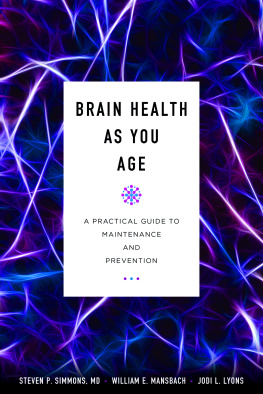
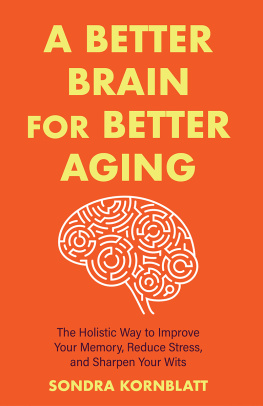
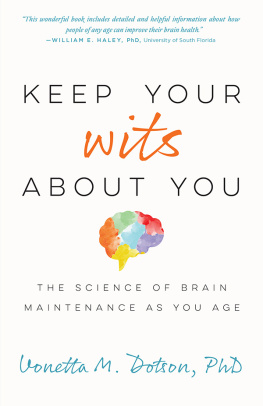

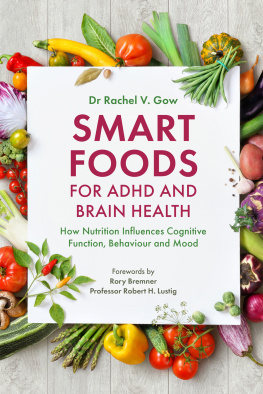

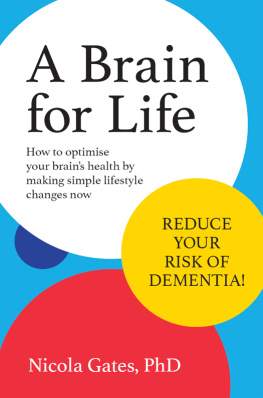
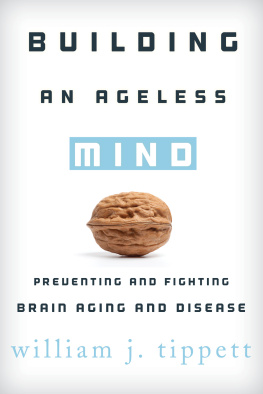
 TM The paper used in this publication meets the minimum requirements of American National Standard for Information Sciences Permanence of Paper for Printed Library Materials, ANSI/NISO Z39.48-1992.
TM The paper used in this publication meets the minimum requirements of American National Standard for Information Sciences Permanence of Paper for Printed Library Materials, ANSI/NISO Z39.48-1992.